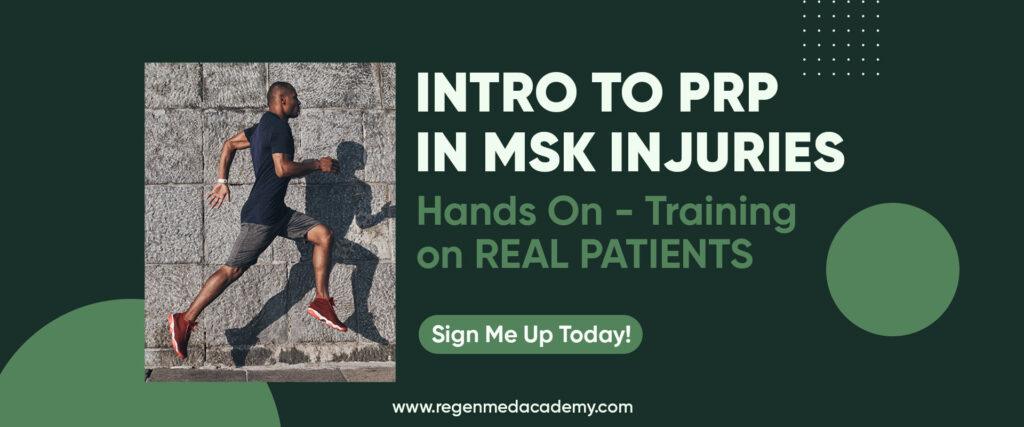Introduction to Platelet-Rich Plasma (PRP) Therapy for Musculoskeletal Injuries

Student: 3
Views: 2544
Introduction to Platelet-Rich Plasma (PRP) Therapy for Musculoskeletal Injuries
Category
PRP
- |
Last Update
17 May, 2024
- |
Instructor
The Regenerative Medicine Academy
OVERVIEWS
About The Course
The Introduction to PRP Training course is designed for healthcare professionals who are new to Platelet Rich Plasma (PRP) therapy and want to develop a strong foundation in its use for treating musculoskeletal injuries. This course provides essential knowledge and practical skills for leveraging PRP as a minimally invasive treatment for conditions affecting tendons, ligaments, joints, and muscles.
We recommend taking Dr. Jordan Rennicke’s Master MSK Online Course (Lifetime Access) as it will prepare you with a strong foundation.
PRP therapy is a transformative approach that enhances the body’s natural healing processes, offering patients an innovative solution for managing musculoskeletal conditions with reduced recovery times. This introductory course equips you with the core concepts and techniques to confidently integrate PRP into your practice.
Our Approach
At the Regenerative Medicine Academy, we believe in combining fundamental theoretical knowledge with practical, hands-on training. This course ensures that participants not only understand the science behind PRP but also gain experience in its clinical applications. Under expert supervision, you’ll engage in classroom learning, live demonstrations, and guided practice to build confidence and competence in PRP therapy for musculoskeletal injuries.
What Will You Learn?
Foundational Knowledge
- Gain a thorough understanding of Platelet Rich Plasma, including the role of platelets and growth factors in tissue repair.
- Explore the basic principles of PRP preparation, including sample collection and centrifugation.
Introduction to Clinical Applications
- Learn how PRP can be used to treat a variety of musculoskeletal injuries.
- Understand the benefits and limitations of PRP therapy in a clinical setting.
Basic Injection Techniques
- Develop fundamental skills in administering PRP injections.
- Learn proper techniques for injections into tendons, ligaments, and joints, focusing on safety and accuracy.
Patient Assessment and Education
- Understand how to identify ideal candidates for PRP therapy.
- Learn to set realistic expectations with patients and guide them through the recovery process.
Our Hands-On Session
Basic Injection Practice and Diagnostic Ultrasound
- Gain hands-on experience in PRP injection techniques under expert guidance.
- Practice identifying appropriate injection sites using anatomical landmarks.
Live Demonstrations
- Watch experienced trainers perform PRP procedures, observing patient interaction and safety protocols.
Collaborative Learning
- Work alongside peers in guided practice sessions to refine your skills and build confidence in a supportive environment.
Why Choose This Course?
The Introduction to PRP Training course is perfect for physicians, Physician Assistants, Nurse Practitioners, and other healthcare professionals seeking to explore PRP therapy. With a focus on fundamental concepts and beginner-friendly techniques, this course provides a strong starting point for incorporating PRP into your practice.
Our classes are small with up to 5 students per 1 instructor. We make sure you get personalized and focused training.
Take the first step in your PRP journey. Enroll today and discover how this innovative therapy can transform musculoskeletal injury management.
COURSE AVAILABLE DATES :
10/16/2024
10/16/2024
10/16/2024
10/16/2024
FOLLOW US :
CONTACT US :

$1,800.00
Course Information
Course Level : Beginner
Instructor : RMA
Duration : 9h 30m
Last Update : 17 May, 2024
Material Includes
- 9 Hour Training
- Slide Deck
- Essential Resources
- History and Consent Forms
- Lifetime Access Support
- Certificate of Hands-On Training
Requirements
- No Prior Knowledge of PRP
- No Prior Knowledge of Diagnostic Ultrasound
- Positive Attitude
Audience
- MD & DO
- PA & NP
- Primary Care Physicians
- DPM’s
- Chiropractors
- Physical Therapists
- Naturopathic Doctors
- Nurses
- Office Administrators
